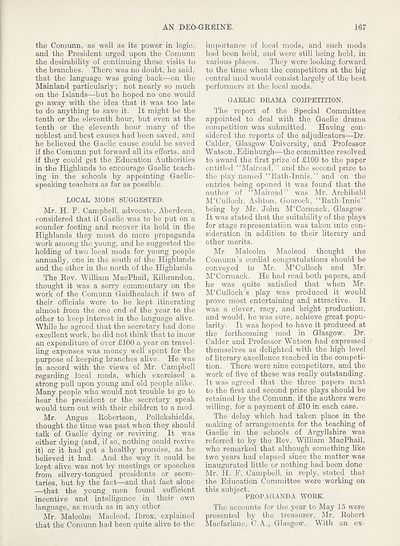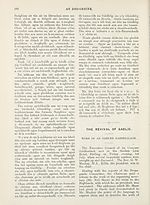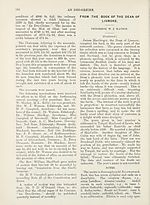An Comunn Gàidhealach Publications > Deo-gréine > Volume 16, October 1920-September 1921
(175) Page 167
Download files
Complete book:
Individual page:
Thumbnail gallery: Grid view | List view

AN DE6-GREINE.
167
the Comunn, as well as its power in logic,
and the President urged upon the Comunn
the desirability of continuing these visits to
the branches. There was no doubt, he said,
that the language was going back—on the
Mainland particularly; not nearly so much
on the Islands—but he hoped no one would
go away with the idea that it was too late
to do anything to save it. It might be the
tenth or the eleventh hour, but even at the
tenth or the eleventh hour many of the
noblest and best causes had been saved, and
he believed the Gaelic cause could be saved
if the Comunn put forward all its efforts, and
if they could get the Education Authorities
in the Highlands to encourage Gaelic teach¬
ing in the schools by appointing Gaelic¬
speaking teachers as far as possible.
LOCAL MODS SUGGESTED.
Mr. H. F. Campbell, advocate, Aberdeen,
considered that if Gaelic was to be put on a
sounder footing and recover its hold in the
Highlands they must do more propaganda
work among the young, and he suggested the
holding of two local mods for young people
annually, one in the south of the Highlands
and the other in the north of the Highlands.
The Rev. William MacPhail, Kilbrandon,
thought it was a sorry commentary on the
work of the Comunn Gaidhealach if two of
their officials were to be kept itinerating
almost from the one end of the year to the
other to keep interest in the language alive.
While he agreed that the secretary had done
excellent work, he did not think that to incur
an expenditure of over £100 a year on travel¬
ling expenses was money well spent for the
purpose of keeping branches alive. He was
in accord with the views of Mr. Campbell
regarding local mods, which exercised a
strong pull upon young and old people alike.
Many people who would not trouble to go to
hear the president or the secretary speak
would turn out with their children to a mod.
Mr. Angus Robertson, Pollokshields,
thought the time was past when they should
talk of Gaelic dying or reviving. It was
either dying (and, if so, nothing could revive
it) or it had got a healthy promise, as he
believed it had. And the way it could be
kept alive was not by meetings or speeches
from silvery-tongued presidents or secre¬
taries, but by the fact—and that fact alone
—that the young men found sufficient
incentive and intelligence in their own
language, as much as in any other.
Mr. Malcolm Macleod, Ibrox, explained
that the Comunn had been quite alive to the
importance of local mods, and such mods
had been held, and were still being held, in
various places. They were looking forward
to the time when the competitors at the big
central mod would consist largely of the best
performers at the local mods.
GAELIC DRAMA COMPETITION.
The report of the Special Committee
appointed to deal with the Gaelic drama
competition was submitted. Having con¬
sidered the reports of the adjudicators—Dr.
Calder, Glasgow University, and Professor
Watson, Edinburgh—the committee resolved
to award the first prize of £100 to the paper
entitled “Mairead,” and the second prize to
the play named “Rath-Innis, ” and on the
entries being opened it was found that the
author of “Mairead” was Mr. Archibald
M'Culloch, Ashton, Gourock, “Rath-Innis”
being by Mr. John M'Cormack, Glasgow.
It was stated that the suitability of the plays
for stage representation was taken into con¬
sideration in addition to their literary and
other merits.
Mr. Malcolm Macleod thought the
Comunn’s cordial congratulations should be
conveyed to Mr. M'Culloch and Mr.
M'Cormack. He had read both papers, and
he was quite satisfied that when Mr.
M'Culloch’s play was produced it would
prove most entertaining and attractive. It
was a clever, racy, and bright production,
and would, he was sure, achieve great popu¬
larity. It was hoped to have it produced at
the forthcoming mod in Glasgow. Dr.
Calder and Professor Watson had expressed
themselves as delighted with the high level
of literary excellence reached in the competi¬
tion. There were nine competitors, and the
work of five of these was really outstanding.
It was agreed that the three papers next
to the first and second prize plays should be
retained by the Comunn, if the authors were
willing, for a payment of £10 in each case.
The delay which had taken place in the
making of arrangements for the teaching of
Gaelic in the schools of Argyllshire was
referred to by the Rev. William MacPhail,
who remarked that although something like
two years had elapsed since the matter was
inaugurated little or nothing had been done
Mr. H. F. Campbell, in reply, stated that
the Education Committee were working on
this subject.
PROPAGANDA WORK.
The accounts for the year to May 15 were
presented by the treasurer, Mr. Robert
Macfarlane, C.A., Glasgow. With an ex-
167
the Comunn, as well as its power in logic,
and the President urged upon the Comunn
the desirability of continuing these visits to
the branches. There was no doubt, he said,
that the language was going back—on the
Mainland particularly; not nearly so much
on the Islands—but he hoped no one would
go away with the idea that it was too late
to do anything to save it. It might be the
tenth or the eleventh hour, but even at the
tenth or the eleventh hour many of the
noblest and best causes had been saved, and
he believed the Gaelic cause could be saved
if the Comunn put forward all its efforts, and
if they could get the Education Authorities
in the Highlands to encourage Gaelic teach¬
ing in the schools by appointing Gaelic¬
speaking teachers as far as possible.
LOCAL MODS SUGGESTED.
Mr. H. F. Campbell, advocate, Aberdeen,
considered that if Gaelic was to be put on a
sounder footing and recover its hold in the
Highlands they must do more propaganda
work among the young, and he suggested the
holding of two local mods for young people
annually, one in the south of the Highlands
and the other in the north of the Highlands.
The Rev. William MacPhail, Kilbrandon,
thought it was a sorry commentary on the
work of the Comunn Gaidhealach if two of
their officials were to be kept itinerating
almost from the one end of the year to the
other to keep interest in the language alive.
While he agreed that the secretary had done
excellent work, he did not think that to incur
an expenditure of over £100 a year on travel¬
ling expenses was money well spent for the
purpose of keeping branches alive. He was
in accord with the views of Mr. Campbell
regarding local mods, which exercised a
strong pull upon young and old people alike.
Many people who would not trouble to go to
hear the president or the secretary speak
would turn out with their children to a mod.
Mr. Angus Robertson, Pollokshields,
thought the time was past when they should
talk of Gaelic dying or reviving. It was
either dying (and, if so, nothing could revive
it) or it had got a healthy promise, as he
believed it had. And the way it could be
kept alive was not by meetings or speeches
from silvery-tongued presidents or secre¬
taries, but by the fact—and that fact alone
—that the young men found sufficient
incentive and intelligence in their own
language, as much as in any other.
Mr. Malcolm Macleod, Ibrox, explained
that the Comunn had been quite alive to the
importance of local mods, and such mods
had been held, and were still being held, in
various places. They were looking forward
to the time when the competitors at the big
central mod would consist largely of the best
performers at the local mods.
GAELIC DRAMA COMPETITION.
The report of the Special Committee
appointed to deal with the Gaelic drama
competition was submitted. Having con¬
sidered the reports of the adjudicators—Dr.
Calder, Glasgow University, and Professor
Watson, Edinburgh—the committee resolved
to award the first prize of £100 to the paper
entitled “Mairead,” and the second prize to
the play named “Rath-Innis, ” and on the
entries being opened it was found that the
author of “Mairead” was Mr. Archibald
M'Culloch, Ashton, Gourock, “Rath-Innis”
being by Mr. John M'Cormack, Glasgow.
It was stated that the suitability of the plays
for stage representation was taken into con¬
sideration in addition to their literary and
other merits.
Mr. Malcolm Macleod thought the
Comunn’s cordial congratulations should be
conveyed to Mr. M'Culloch and Mr.
M'Cormack. He had read both papers, and
he was quite satisfied that when Mr.
M'Culloch’s play was produced it would
prove most entertaining and attractive. It
was a clever, racy, and bright production,
and would, he was sure, achieve great popu¬
larity. It was hoped to have it produced at
the forthcoming mod in Glasgow. Dr.
Calder and Professor Watson had expressed
themselves as delighted with the high level
of literary excellence reached in the competi¬
tion. There were nine competitors, and the
work of five of these was really outstanding.
It was agreed that the three papers next
to the first and second prize plays should be
retained by the Comunn, if the authors were
willing, for a payment of £10 in each case.
The delay which had taken place in the
making of arrangements for the teaching of
Gaelic in the schools of Argyllshire was
referred to by the Rev. William MacPhail,
who remarked that although something like
two years had elapsed since the matter was
inaugurated little or nothing had been done
Mr. H. F. Campbell, in reply, stated that
the Education Committee were working on
this subject.
PROPAGANDA WORK.
The accounts for the year to May 15 were
presented by the treasurer, Mr. Robert
Macfarlane, C.A., Glasgow. With an ex-
Set display mode to:
![]() Universal Viewer |
Universal Viewer | ![]() Mirador |
Large image | Transcription
Mirador |
Large image | Transcription
| An Comunn Gàidhealach > An Comunn Gàidhealach Publications > Deo-gréine > Volume 16, October 1920-September 1921 > (175) Page 167 |
|---|
| Permanent URL | https://digital.nls.uk/125656087 |
|---|
| Description | Leabhar 16, Mìos Deireannach an Fhogharaidh 1920 gu Darna Mìos an Fhoghair 1921 |
|---|---|
| Attribution and copyright: |
|
| Description | This contains items published by An Comunn, which are not specifically Mòd-related. It includes journals, annual reports and corporate documents, policy statements, educational resources and published plays and literature. It is arranged alphabetically by title. |
|---|
| Description | A collection of over 400 items published by An Comunn Gàidhealach, the organisation which promotes Gaelic language and culture and organises the Royal National Mòd. Dating from 1891 up to the present day, the collection includes journals and newspapers, annual reports, educational materials, national Mòd programmes, published Mòd literature and music. |
|---|---|
| Additional NLS resources: |
|

